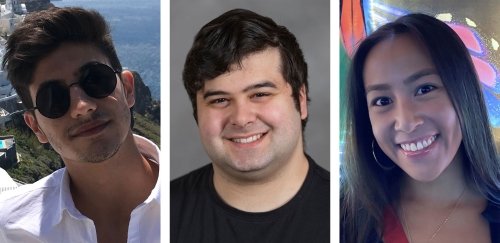Language Graduates Prepare to Take on the World
- News & Events
- News
- Language Graduates Prepare to Take on the World

Award-winning graduates leave behind a lasting legacy on the World Languages Education Program at RIC.
If a Mount Rushmore sculpture were to be created featuring world languages students from Rhode Island College, the faces of Joshua Abreu, Anthony Diebold and Lilly Ngolvorarath would be front and center.
Erin Papa, assistant professor of world languages education at RIC, says she’s confident this trio of 2021 graduates will build upon the impressive track record of success they’ve already accumulated in college.
“They want to go abroad for at least a year and then come back to the United States and teach,” Papa says. “In college, they have worked well together, pushing each other to learn more, ask questions and share with others. In our world languages department, they have formed an amazing professional learning community.”
While at RIC, Ngolvorarath, Diebold and Abreu have tested their language skills by participating in study abroad programs in such locales as Argentina, Portugal and Canada. Later this year, Ngolvorarath and Abreu have plans to teach English in Spain while Diebold is heading to Taiwan, where he was selected to be an English teaching assistant in the prestigious Fulbright Fellowship program.
If not for the pandemic, Abreu would have traveled to Brazil this summer as the first ever RIC student chosen to participate in the equally distinguished U.S. Department of State Critical Language Scholarship program, an eight-to-10-week venture that selects only 10 percent of applicants from undergraduate and graduate programs to study one of 15 critical languages.
“I was super excited to receive the email and surprised that I was selected,” says Abreu, who will participate in the program through virtual Zoom courses this summer.
Meanwhile, Diebold is brushing up on his Chinese.
“The idea of the Fulbright Fellowship is to give the Taiwanese students there an authentic experience about what life is like in the United States,” he explains. “One such experience I plan to share with families at the school is how to cook a Rhode Island dish.”
Diebold and Ngolvorarath were named co-recipients of the 2021 Katherine Murray Prize, which honors students who embody the qualities and values that Murray, a former RIC professor in the Department of Secondary Education, sought to instill in her teacher education students. For his commitment to studying Portuguese and Lusophone culture, Abreu was named one of the recipients of the 2021 John A. and Mary V. Lima Memorial Scholarship.
Maricarmen Margenot, a RIC associate professor of Spanish, says she believes the future is bright for Ngolvorarath and Abreu.
“Joshua always impressed me with his intelligence, work ethic and tenacity to achieve his goals,” Margenot says. “I have no doubt he will be a gifted and model educator. With regards to Lilly, she is passionate about her discipline while also poised and persuasive. Her curiosity about other cultures is admirable but above all, she’s a compassionate and kind human being.”
Chiara Falangola, a RIC associate professor of French and Italian, shared equally glowing remarks about Diebold.
“Anthony is without a doubt the best student of French language and literature I’ve ever had,” Falangola says. “His critical and analytical abilities, as well as his clarity in his written assignments, are definitely at the level of a graduate student. He’s also a terrific French tutor and a wonderful, empathic human being.”
Each of these distinguished world languages grads pay homage to this mantra: learning multiple languages is critical for success. While an estimated 60 percent of the world speaks at least two languages, in America that number is precipitously lower, with less than 20 percent speaking a second language.
Ngolvorarath is calling for swift reform.
“Schools want their students to become global citizens. Everyone should be open to learn new ways to teach and to know that changes come with time.”
Diebold says that change is apparent in Rhode Island and beyond.
“In Providence multiple languages are spoken, from French to Portuguese, and that shows students that language is relevant in their lives,” he says.
Abreu adds that learning multiple languages is increasingly valued in the job market. “From business to accounting, in virtually any field, the ability to know languages sets you apart from others,” he says.
According to a U.S. Bureau of Labor Statistics report, jobs in the fields of translation and interpretation are the fastest growing occupations in the U.S., with an anticipated growth rate of 19 percent over the next decade.
As this trio of future educators moves on to begin their careers, they collectively paused to applaud the World Languages Education program’s recent makeover, which calls for a semester for students to study abroad.
“Every student should get that type of hands-on experience to study abroad,” Ngolvorarath says.
And Abreu says he’s confident that the world languages program will retain its community feeling.
“The end result of this program is to graduate students who are in love with what they do,” Abreu says.
